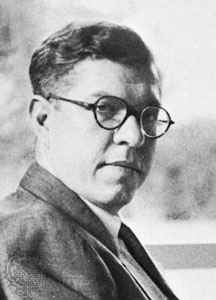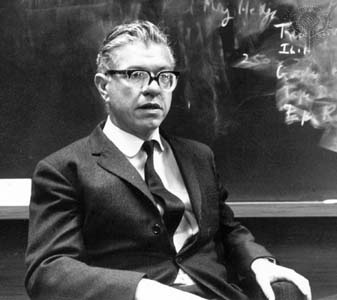Hoyle, Sir Fred
British astronomer
born June 24, 1915, Bingley, Yorkshire 【now West Yorkshire】, England
died August 20, 2001, Bournemouth, Dorset
 British mathematician and astronomer best known as the foremost proponent and defender of the steady-state theory of the universe. This theory holds both that the universe is expanding and that matter is being continuously created to keep the mean density of matter in space constant.
British mathematician and astronomer best known as the foremost proponent and defender of the steady-state theory of the universe. This theory holds both that the universe is expanding and that matter is being continuously created to keep the mean density of matter in space constant.Hoyle was educated at Emmanuel College and St. John's College, Cambridge, and spent six years during World War II with the British Admiralty, working on radar development. In 1945 he returned to Cambridge as a lecturer in mathematics. Three years later, in collaboration with the astronomer Thomas Gold and the mathematician Hermann Bondi, he announced the steady-state theory. Within the framework of Albert Einstein's theory of relativity, Hoyle formulated a mathematical basis for the steady-state theory, making the expansion of the universe and the creation of matter interdependent.
 In the late 1950s and early '60s, controversy about the steady-state theory grew. New observations of distant galaxies and other phenomena, supporting the big-bang theory (a phrase that Hoyle had coined in derision in the 1940s), weakened the steady-state theory, and it has since fallen out of favour with most cosmologists. Although Hoyle was forced to alter some of his conclusions, he tenaciously tried to make his theory consistent with new evidence.
In the late 1950s and early '60s, controversy about the steady-state theory grew. New observations of distant galaxies and other phenomena, supporting the big-bang theory (a phrase that Hoyle had coined in derision in the 1940s), weakened the steady-state theory, and it has since fallen out of favour with most cosmologists. Although Hoyle was forced to alter some of his conclusions, he tenaciously tried to make his theory consistent with new evidence.Hoyle was elected to the Royal Society in 1957, a year after joining the staff of the Hale Observatories (now the Mount Wilson and Palomar observatories). In collaboration with William Fowler and others in the United States, he formulated theories about the origins of stars as well as about the origins of elements within stars. Hoyle was director of the Institute of Theoretical Astronomy at Cambridge (1967–73), an institution he was instrumental in founding. He received a knighthood in 1972.
Hoyle is known for his popular science works, including The Nature of the Universe (1951), Astronomy and Cosmology (1975), and The Origin of the Universe and the Origin of Religion (1993). He also wrote novels, plays, short stories, and an autobiography, The Small World of Fred Hoyle (1986).
- Adler, Cyrus
- Adler, Dankmar
- Adler, Felix
- Adler, Guido
- Adler, Kurt
- Adler, Larry
- Adler, Lawrence James
- Adler, Mortimer J.
- Adler, Nathan Marcus
- Adler, Renata
- Adler, Sara
- Adlersparre, Georg, Greve
- Adler, Stella
- Adler, Victor
- Admetus
- Administration of drugs
- administrative law
- admiral
- Admiral carpet
- Admiral's Cup
- Admiral's Cup Table
- Admiral's Men
- Admiralty
- Admiralty Inlet
- Admiralty Islands